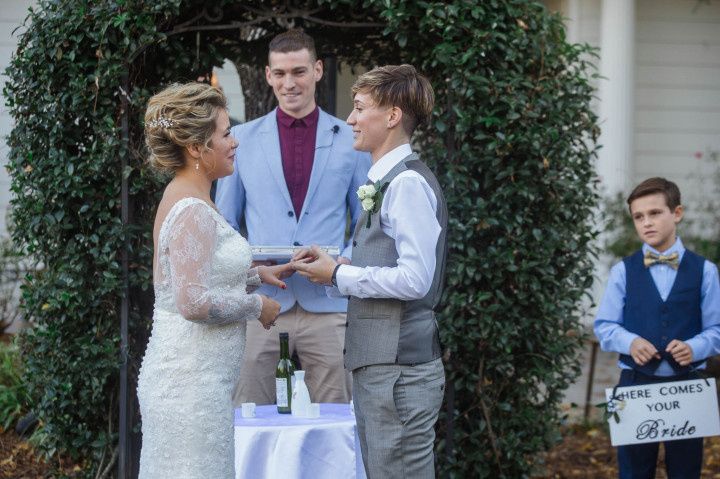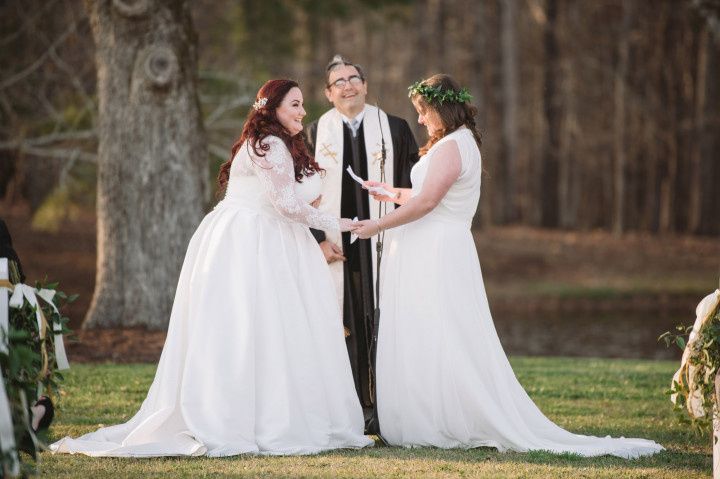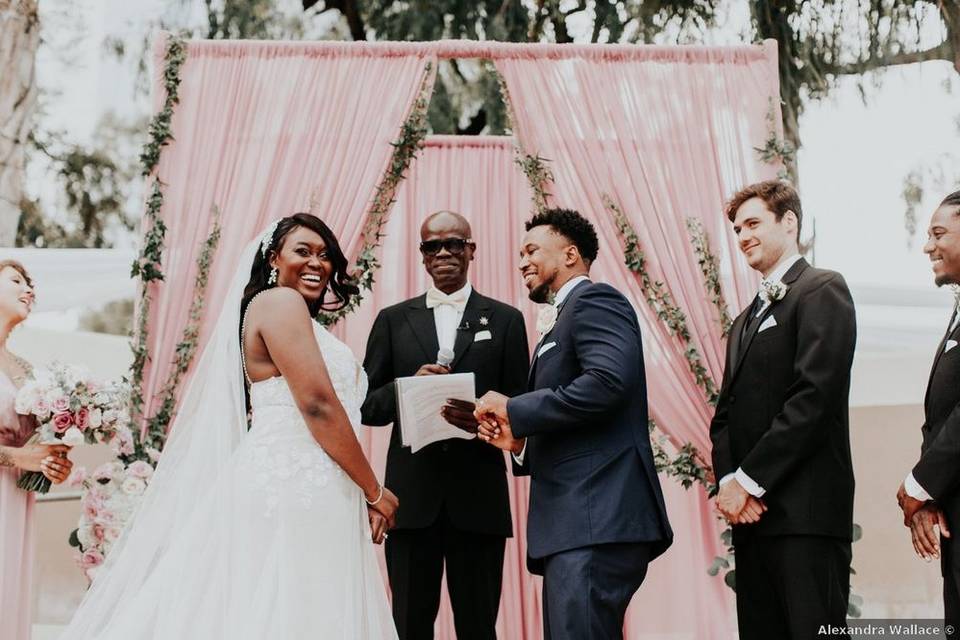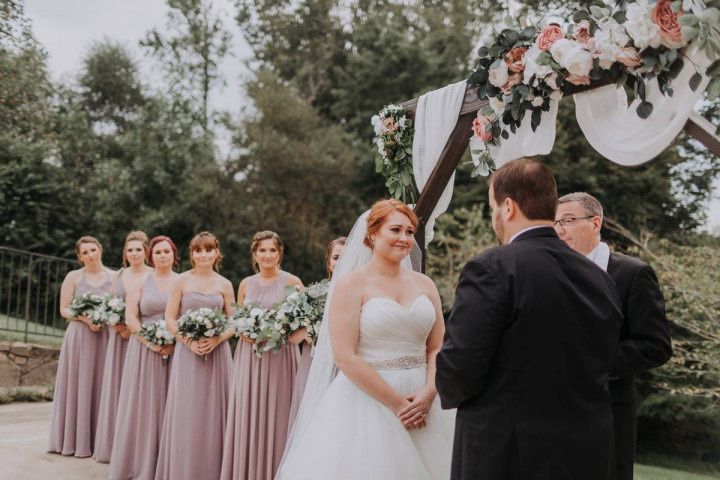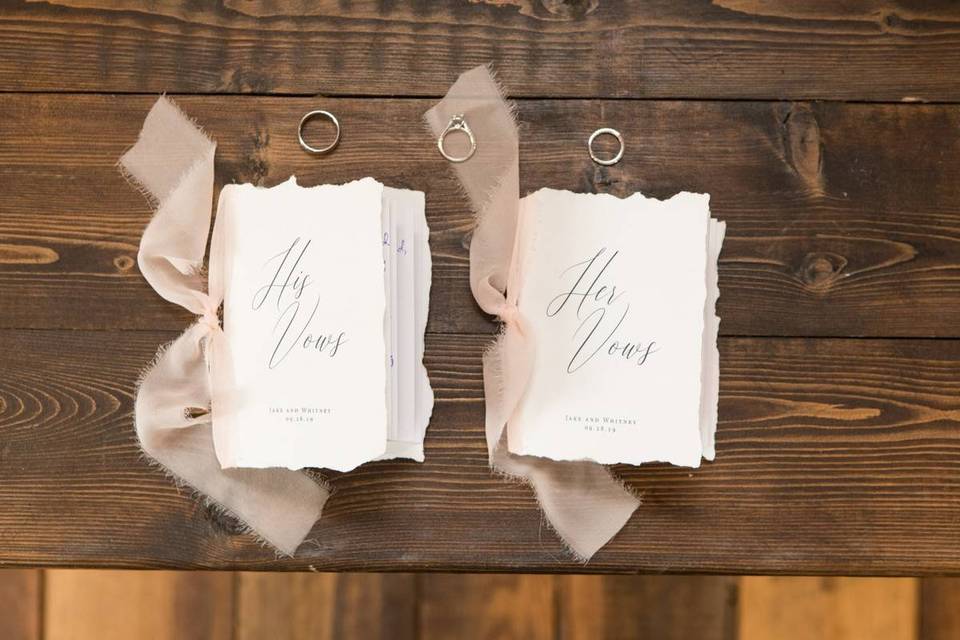Should We Write Our Own Vows? How to Know if It's Right For You
Sure, personal vows might sound super-romantic, but they're not for everyone. Here's how to decide if you should write your own vows or not.
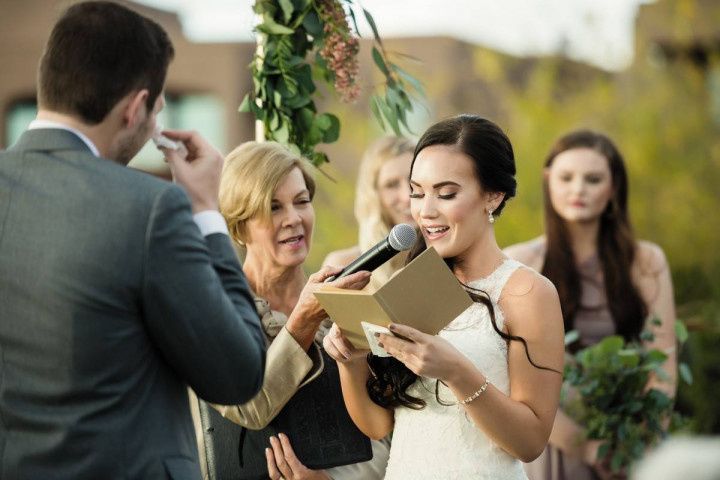
Sure, catering, décor, and dancing might be what makes it feel like a wedding, but the vows you exchange with your partner are what make it actually a wedding. You can’t get married without vows! (For all intents and purposes, anyway). But how to know if you should write your own vows or go with some old classics? It really depends on your personal preference and comfort level—and whatever you choose should be your choice, not someone else’s.
If you and your partner are pondering the question “should we write our own vows?”, here are a few questions to ask yourself.
Do you love writing?
When thinking about if you should write your own vows, having a creative side and experience writing (extra points if you really love it!) make a huge difference. Maybe the idea of reading someone else’s words makes your skin crawl, maybe the idea of writing your own vows sounds worse than getting a cavity filled. Writing vows is a deeply expressive and creative endeavor and while you definitely don’t need to be “good” at writing or a “professional” to write amazing vows, the process of writing and performing them in front of dozens of people will be a lot more enjoyable if you vibed with the process and are proud of the result.
Are you comfortable reading your words in public?
This question goes hand-in-hand with the one above—even if you love writing, you might hate reading your words aloud in front of people. That’s a whole ‘nother ball game for most writers and creatives, so you’re not crazy if you feel this way. If the idea of standing before your guests and reading your most intense and personal emotions out loud makes you feel squeamish, you may wish to go for pre-written vows (you can even inject a few of your own sentences throughout to personalize it!). Reading words that are not your own can significantly cut down on the fear factor (because it won’t feel like you’re pouring out your heart and soul) and help you stay focused and grounded. If you love the idea of writing your own vows but not necessarily performing them, recite them in private to your partner the night before your wedding, then opt for traditional vows during the ceremony.
Are you a traditionalist?
If you’ve always dreamed of a classic wedding with all the pomp and circumstance, creative vows might not give you the payoff you seek. While handwritten vows have a romance and personality all their own, traditional vows have a certain gravitas that wedding traditionalists will find very special. If you’re opting in to every other wedding tradition (e.g., not seeing your spouse until you reach the altar and walking down the aisle to Canon in D) classic vows are probably right for you. They will feel like the “real deal” to you while fitting in perfectly with your classic wedding style.
Do you have the time?
A big part of deciding if you should write your own vows comes down to timing. The process of writing your own vows should be an emotional and enjoyable experience. If you’re so swamped with wedding planning and the rest of your life you can barely find the time to put pen to paper, however, the process can feel like a chore, or even worse, like a last-minute project you have to cram into the night before your wedding. That’s not fair to you or your spouse-to-be! You simply will not be proud of your vows unless you give them the time and energy you deserve to give them (and your future spouse deserves to receive). If you’ve spent too much time constructing a donut wall and don’t have enough time to devote to writing your vows, go traditional—and add your own flair as needed. If you’re just starting your planning journey and want to avoid backing yourself into a last-minute corner when it comes to writing your vows, block out a few hours a week in the months leading up to your wedding to spend only working on your vows. You’ll be glad you did once the time comes!
Is your partner planning on writing his or hers?
It’s not a rule of thumb that if one of you opts for custom vows, the other must too, but it is something to think about. Your universal vows might feel out-of-place after your partner reads their handwritten ones. If one of you has a steadfast opinion on going handwritten vs. traditional, that could help decide what the other chooses. It will make for a more unified ceremony if you both make the same decision. And if you choose to go handwritten because one-half of you is really into the idea, you’re totally allowed to workshop your vows together to make sure you’re both feeling confident and comfortable when the big day comes. At the end of the day, what matters most is that you both get to do what feels best on your wedding day, and in the grand world of wedding planning, that usually entails working together and making compromises.

